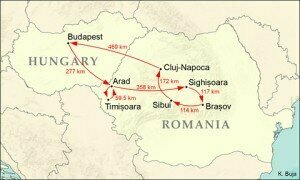 In their September 1879 trip, Johannes Brahms, pianist, and Joseph Joachim, violinist, ventured into what was, to them, the furthest corners of civilization for these two Viennese-based musicians. The first part of their trip, Budapest to Arad to Timişoara covered 396 km, done by train and carriage. Their next leg took them to Sighişoara via narrow-gauge railway into the Carpathian Mountains.
In their September 1879 trip, Johannes Brahms, pianist, and Joseph Joachim, violinist, ventured into what was, to them, the furthest corners of civilization for these two Viennese-based musicians. The first part of their trip, Budapest to Arad to Timişoara covered 396 km, done by train and carriage. Their next leg took them to Sighişoara via narrow-gauge railway into the Carpathian Mountains.
Sighişoara was a small picturesque fortified medieval Saxon town and the performance was given in the Trade Association Hall.
The programme included works by Schubert, Brahms, Tartini, Spohr, and the Romance movement from Joachim’s Violin Concerto ‘In the Hungarian Style,’ arranged for violin and piano.
Joachim: Violin Concerto in D Minor, Op. 11, ‘in ungarischer Weise’ (In the Hungarian Style): II. Romanze: Andante (Christian Tetzlaff, violin; Danish National Symphony Orchestra; Thomas Dausgaard, cond.)
The reviewer in Sighişoara said ‘We heard not virtuosos, but rather artists in the true sense of the world, whose performance defies all description.’ One reviewer called this the duo’s ‘vacation tour,’ and another noted that after the concert, the ‘great and yet so modest artists’ had entertained them until after midnight.
Following a light lunch at a villa with views of the green hills and snowy mountains, they returned to the train to go to Braşov. The build-up for the concert in Braşov started two weeks earlier. Committees were formed to plan tributes to Brahms and Joachim, coming from each of the city’s ethnic groups: German, Romanian, and Hungarian.
The concerts were sold out. They opened the concert with Spohr’s Violin Concerto No. 8 and closed with Beethoven’s Kreutzer Sonata.
Spohr: Violin Concerto No. 8 in A Minor, Op. 47, ‘in modo di scena cantante’ (In the style of an opera aria): III. Allegro moderato (Hilary Hahn, violin; Swedish Radio Symphony Orchestra; Eiji Oue, cond.)
One reviewer noted that the city’s ‘art-loving public had never yet experienced such pleasure.’ He continued, saying that the after-concert dinner included toasts and a performance by the city’s orchestra, ‘which played several pieces with such excellence that both artists were visibly surprised.’ After the concert, too, local musicians were asked to play Romanian music and the best were asked to play a shepherd’s song, Ciobanului, from the area.
‘Doina ciobanului’ performed by Dumitru Potoroacă (fiddle) and Marin Cotoanță (folk lute)
The city orchestra also performed Romanian music and Brahms asked the city’s Kapellmeister for the best compositions.
The post-concert articles noted with gratitude that Brahms and Joachim weren’t just hit-and-run performers, in town for their concert and quickly off again, but that the artists had stayed for 2 days and had taken in the sights. One stop on their tour was a trip to the top of Mount Tâmpa, a hulking limestone mountain on the edge of the city.
And now, to Sibui by train. Brahms and Joachim travelled with a Streicher piano and two of Joachim’s Stadivarius violins (over his lifetime, Joachim would own 11 different Stradivarius violins). When they arrived in Sibui, their piano didn’t. A resident lent his Blüthner piano for concert and a reporter, waxing lyrical, said that ‘The wonderful instrument didn’t spare its favours; it seemed to sense its master and sang under his hand….’ The concert opened with Brahms’ Violin Concerto. It and his Op. 76 Caprices came in for praise. Schumann, Gluck, Tartini, Bach, and Schubert rounded out the evening.
Brahms: Violin Concerto in D major, Op. 77: I. Allegro non troppo (cadenza by J. Joachim) (Hilary Hahn, violin; Academy of St. Martin in the Fields Orchestra; Neville Marriner, cond.)
Reporters outdid themselves in praising the concert, saying that Johannes Brahms ‘is the greatest composer that one can hear anywhere today’ and praising Joachim for the frenzied applause after the Tartini and the unaccompanied Bach suite and concluding that ‘Only such a violinist could be Brahms’ companion.’
Tartini: Violin Sonata in G Minor, ‘The Devil’s Trill’: IV. Allegro assai (David Garrett, violin; Alexander Markovich, piano)
Next stop: Cluj
